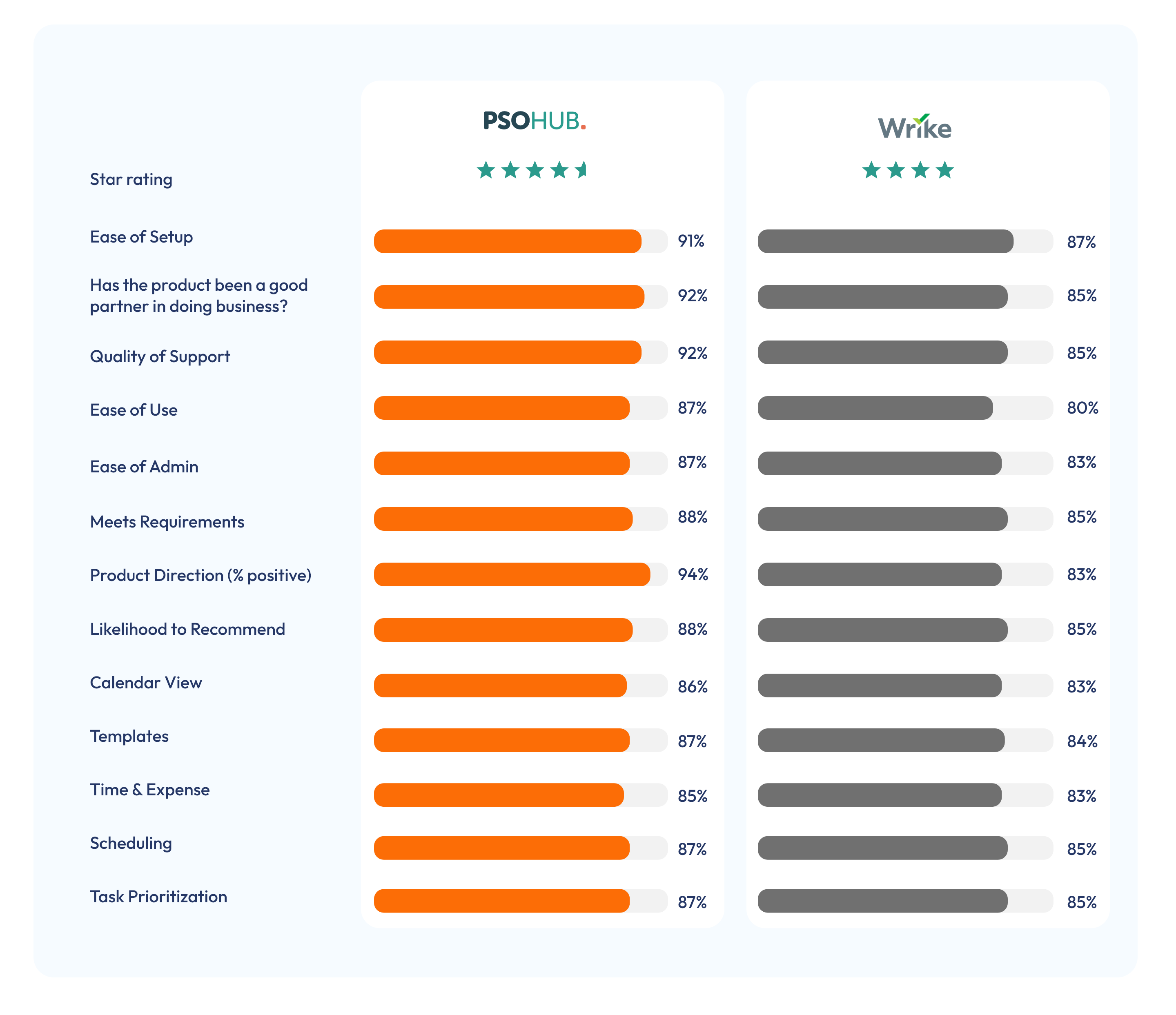Alternatives to Wrike
Top Wrike alternatives for project management

Unlocking Efficiency: Wrike vs. PSOhub
When it comes to optimizing your workflow and project management, the choice is clear. Discover why PSOhub is outshining Wrike across 13 critical metrics, according to independent reviews on G2.com. Join us on this journey of comparison and find out how PSOhub can elevate your business to new heights of productivity and success.

Visualize the Difference: Dive into our Features Comparison Matrix Between Wrike and PSOhub!
In the world of project management and productivity tools, choosing the right solution is paramount. To help you make an informed decision, we've created a comprehensive Features Comparison Matrix, showcasing how Wrike and PSOhub stack up against each other.

Wrike overview
Wrike provides one of the most comprehensive cloud-based solutions for collaboration and project management today. This all-in-one environment is a favorite of larger enterprise organizations that need to keep all their project and customer data secure, accessible, and organized under one digital roof.
Wrike’s robust functionality includes all pieces of the project management pie, from contracts and planning, to invoicing and resource management. You can also use Wrike as a bonafide CRM for your sales team to keep your tech stack as efficient as possible.
The dominant industries that use Wrike for project management and team collaboration include IT services, retail, marketing, and financial services. Teams like these benefit from Wrike’s extensive planning and task management tools that are highly rated for complex projects.
Wrike’s automation and customizations are next to none, but its somewhat complicated interface isn’t for everyone. Many users remark that it can take significant time for teams to adjust to the Wrike environment, and it currently does not provide a two-way integration with Dynamics 365 CRM.
Wrike vs. PSOhub
When it comes to functionality for both project management and team collaboration, Wrike and PSOhub are neck and neck. Each platform offers a comprehensive, all-in-one environment for project management, along with industry-best automated features that boost efficiency.
PSOhub and Wrike make collaborating around projects a seamless experience with highly rated task management features. Users of both solutions love the automated invoicing capabilities, where invoices can be tied directly to the correct project from time tracking data. Real-time Gantt charts and capacity planning tools are also frequently praised by PSOhub and Wrike teams alike.
For comparable functionality, PSOhub and Wrike’s pricing tiers hover around the same amounts.
The major difference is that Wrike offers a free version, whereas PSOhub does not. Note that Wrike’s free version is strictly limited to task management and does not include other project management features like contracts, invoicing, etc.
There are just a few other points of differentiation for these two powerful tools. For one, Wrike offers a full-blown CRM as part of their functionality at the higher price points; PSOhub does not. However, PSOhub offers a two-way integration with the Dynamics 365 CRM, something currently not available with Wrike. PSOhub also offers time tracking in all their packages, a feature only available with Wrike Business and Enterprise.
Perhaps the biggest difference between PSOhub and Wrike is more subjective, with relation to user experience. For example, PSOhub is frequently described as easy to use and intuitive, especially for HubSpot users. Wrike, on the other hand, is often referred to as complicated or ‘clunky’, presenting a bit of a learning curve.
Other comparisons

Teamwork vs. PSOhub
Alternatives to Teamwork for project management and time tracking

Monday.com vs. PSOhub
Monday.com alternatives for resource management and project management



